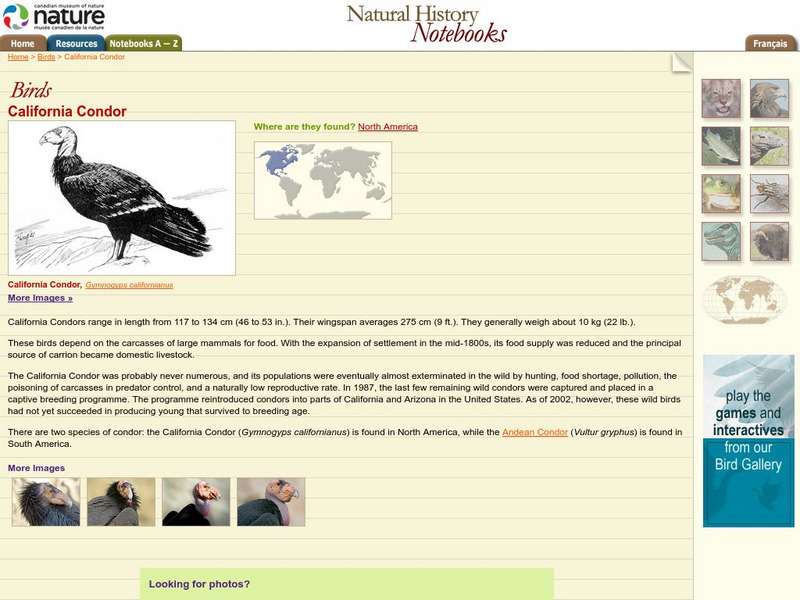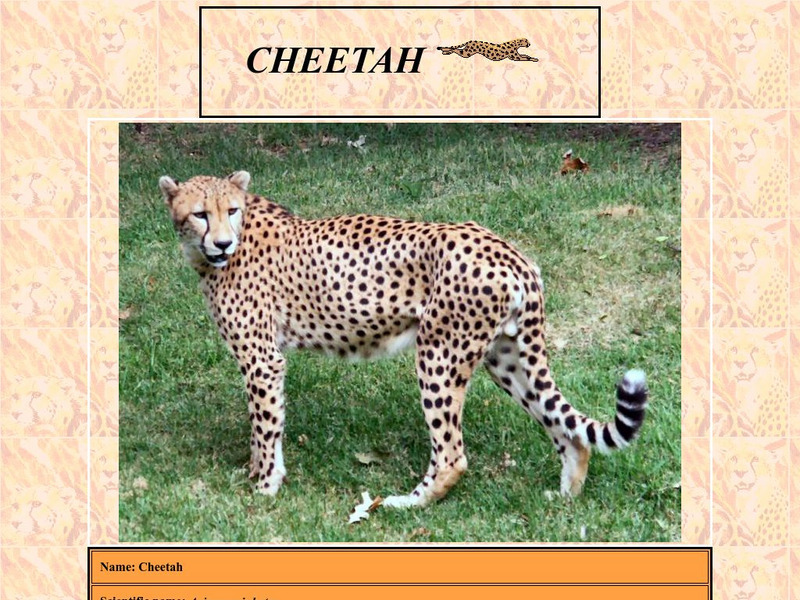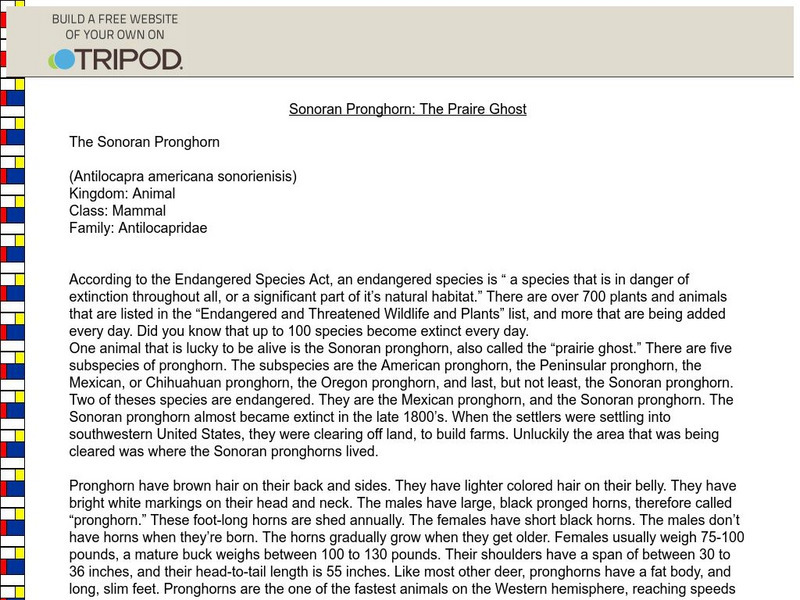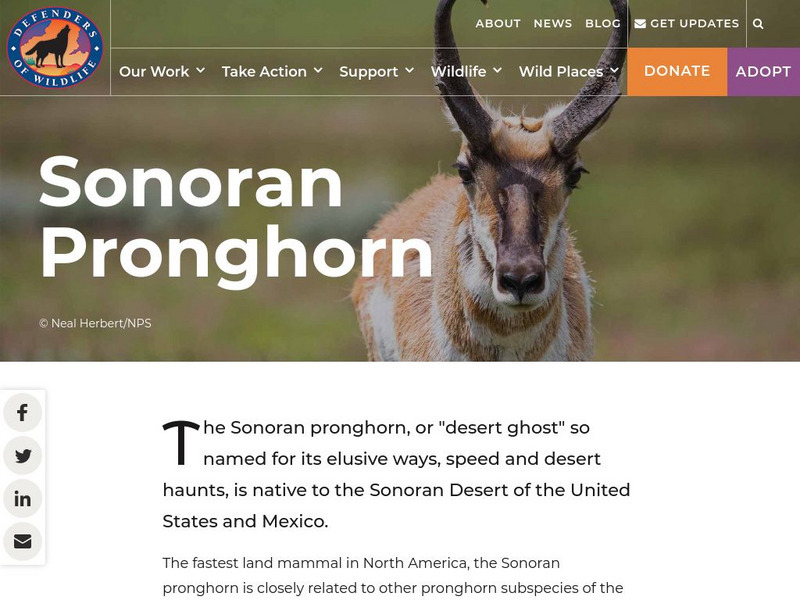Canadian Museum of Nature
Canadian Museum of Nature: Jaguar
The Canadian Museum presents a beautifully illustrated image of a jaguar, followed by a brief descriptive text.
NOAA
Noaa: Ocean Facts on Marine Mammals
The National Oceanic & Atmospheric Administration sponsors this introductory article and related links that tell why marine mammals are valued by the public for their great aesthetic, recreational and economic significance.
McGraw Hill
Mc Graw Hill Ryerson: Human Impacts on Ecosystems
Take this ten question quiz on human impacts on ecosystems. The quiz is multiple choice.
PBS
Pbs Learning Media: Now You See It
Students are asked to identify ways to help these endangered or threatened species.
PBS
Nh Pbs: Nature Works: Sage Grouse
Learn more about the Sage Grouse through this clear and concise resource. Students will find information on the characteristics, life cycle, diet, habitat, behavior and range of this type of running bird.
CNN
Cnn: Wolves Get Help to Make a Comeback in the West
CNN news story about the efforts to reintroduce wolves into the wilds of America.
Text Project
Text Project: Fyi for Kids: Counting Endangered Animals [Pdf]
This FYI for Kids (Volume 5, Issue 2) article focuses on counting endangered animals including how they count them and why. It uses two examples of the use of modern technology to count endangered animals: panthers and humpback whales.
Canadian Museum of Nature
Canadian Museum of Nature: California Condor
There are very few California condors left and the ones that are able to reproduce are in captivity as efforts are made to build up their population. The reasons for their decline are explained here and you can see some pictures of them.
Kidport
Some Animals Live in Rock Caves
This site has brief illustrations and sample locations as to where the tiger, the bear, the moray eel and bat live.
NPR: National Public Radio
Npr: Sanctuary for Fast Cats
The number of cheetahs in the African wilderness has dwindled dramatically in the last 20 years. Find out what is being done in the United States to ensure the survival of this species.
Other
The Cheetahspot
The title says it all. The ultimate site to find out everything you need to know about cheetahs. Content includes information on Cheetah social behavior, diet, appearance, locomotion, vocals, habitat, history, and more.
Other
Who Zoo: Cheetahs
This site gives a great set of Cheetah images along with in depth descriptions. Links to additional information are listed at the bottom of this site.
Other
Animales en Extincion: Reserva Animal
Find out which are the animals that are endangered in America, Europe, Africa, Asia and Oceania.
Other
My Science Box: Food Webs
In this lesson, students will choose an organism of their choice and research its life cycle, food chain, diet, and habitat, then predict how habitat change might affect the organisms living within it.
Other
Sonoran Pronghorn the Praire Ghost
This online "call for help" focuses on the Sororan Pronghorn and its endangered status. Description information about this animal is followed by its status and what you can do to help.
Nature Canada
Nature Canada: Suffield National Wildlife Area: Plants at Risk
Suffield National Wildlife Area in Alberta is home to at least sixteen plant and animal species at risk. Several of the plants are described in detail here. Additional links provide more information.
Exploring Nature
Exploring Nature Educational Resource: Antelope (Addax)
Explore where antelopes live, what they eat, what eats them, how they reproduce, and their complete classification.
Smithsonian Institution
National Museum of Natural History: Hall of Mammals: Scimitar Horned Oryx
Brief overview of the Scimitar-horned oryx and accompanying photos demonstrate the physical adaptations that allow this animal to survive the desert heat.
Smithsonian Institution
National Museum of Natural History: Hall of Mammals: Giant Panda
Brief illustrated overview of the giant panda and an accompanying video demonstrate the physical adaptations that allow this animal to eat and why it has become an endangered species.
Defenders of Wildlife
Defenders of Wildlife: Sonoran Pronghorn
This article, published by the Defenders of Wildlife in February of 2001, announced that a federal judge had ordered seven federal agencies to examine the cumulative impact of bombing, troop maneuvers, low- level flights and other...
Other
Fishin' for Facts: Humpback Whale
The humpback Whale's size, baleen plates, physical characteristics, and habitat are discussed.
Ducksters
Ducksters: Endangered Animals for Kids: Wildlife Conservation
Explore wildlife conservation including saving animal habitats, captive breeding, and tracking animal populations on this site.
American Museum of Natural History
American Museum of Natural History: Ology: Endangered!
After making the gameboard, play this interactive learning game that teaches about "The Endangered Species Act", a law that protects animals and plants that are in danger of going extinct.
NPR: National Public Radio
Npr: Blue Whale Sighting Thrills Researchers
National Public Radio reports on the blue whale, which has been on the endangered species list for almost 40 years. Find out why a recent siting off the coast of Alaska has given researchers some cause for optimism.

















